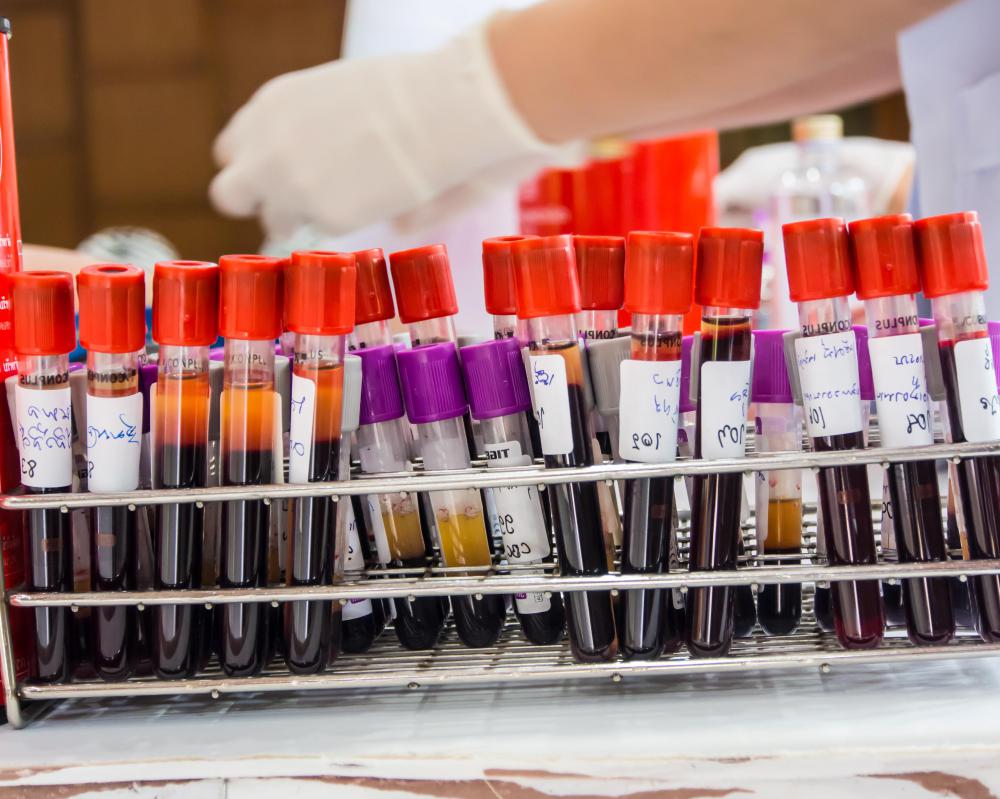At WiseGEEK, we're committed to delivering accurate, trustworthy information. Our expert-authored content is rigorously fact-checked and sourced from credible authorities. Discover how we uphold the highest standards in providing you with reliable knowledge.
Why is HIV in Africa so Severe?
Many people have noticed that HIV in Africa appears to be extremely severe, and some have wondered why this is. There are a number of reasons why HIV in Africa is such a serious problem, ranging from interactions with other diseases present in Africa to social and cultural issues unique to Africa. It is important to remember that HIV/AIDS in Africa is not a single epidemic, as some African nations are managing the situation better than others, and different HIV clades are present in different regions, suggesting that several distinct epidemics are going on.
One of the main reasons that HIV in Africa is so prevalent is that the disease probably originated in Africa, according to the latest genetic research. Obviously, the longer a disease is present in a region, the more likely it is to infect a large proportion of the population. Especially since HIV can have a very long incubation period, Africans could be infected for years without knowing it until the disease emerged, spreading HIV all the while.

HIV/AIDS workers in Africa also face the serious problem of interactions between HIV and other diseases. Tuberculosis, for example, is endemic in Africa, and as a result many HIV/AIDS patients die from tuberculosis, even if their HIV was under control. HIV in Africa is also allowed to progress unchecked in some areas simply because people lack the ability to access the medications they need to treat it, or the supplies to prevent it. HIV/AIDS medications can be extremely expensive, making them well beyond the reach of many Africans, even with assistance from charities.

Cultural values also play a role in the problem. The use of condoms and other barrier devices is frowned upon in some African communities, and in some regions it is commonly acceptable for men to practice extramarital sexual relations, putting their wives and other partners at risk. In other regions of Africa, cultural traditions surrounding death and birth play a role in the AIDS epidemic, as people are exposed to blood and other bodily fluids as a result of contact with the bodies of HIV/AIDS victims.

The spread of HIV in Africa has also been hastened by poor nutrition in many areas, which makes it hard for people to stay healthy, and some people suspect that a minority of HIV/AIDS cases may even be caused by unwitting medical personnel trying to do the right thing. Re-use of syringes, for example, is acceptable in some areas as a result of lack of access to fresh supplies to sterile syringes, so in a single day's vaccination campaign, HIV could be spread to hundreds of children. It is important to stress that this is very rare; the vast majority of medical organizations working in Africa recognize that the AIDS risk is too great to re-use syringes and other potentially contaminated medical supplies.

It is estimated that 60% of the world's HIV/AIDS cases can be found in Africa, and that the problem will only become more severe as more and more Africans are infected. The AIDS epidemic has spawned a generation of AIDS orphans, some of whom are infected themselves, raising concerns that a vicious cycle may evolve in Africa, making it extremely difficult to put a halt to the progression of the disease.
AS FEATURED ON:
AS FEATURED ON:

















Discussion Comments
As a rule, if only three scientists support a theory, it's generally wrong.
In countries where people are too poor to afford medical care, it's hardly surprising HIV statistics in Africa are so grim.
People there still die from syphilis and that disease has been curable for decades. They simply cannot afford to go to the doctor. And some cultures would be hesitant to even discuss AIDS just because of its methods of transmission. Sex and drugs are taboos in a lot of cultures, so admitting you are doing either one is just not going to happen.
AIDS would be just as widespread every else if it had had that much time, and that much freedom to spread.
I have lived in West Africa and AIDs seemed to affect quite a few families, particularly the families of men who traveled, like truckers. The men would have sex while on the road, then bring the disease home to their wives. I couldn't say whether they passed it on by anal sex or not, but judging by the number of children an average family over there has, there was a lot of vaginal sex going on as well.
Condoms are given out by the handful... few people use them. I know this is just anecdotal evidence.
With a quick search I couldn't find what alternative vector the renegade scientists were pushing. Could you enlighten me?
Ninety-nine percent of AIDS and HIV cases in Africa come from sexual transmission, and virtually all is heterosexual. So says the World Health Organization, with other agencies toeing the line. Some massive condom airdrops accompanied by a persuasive propaganda campaign would practically make the epidemic vanish overnight. Or would it?
A determined renegade group of three scientists has fought for years – with little success – to get out the message that no more than a third of HIV transmission in Africa is from sexual intercourse and most of that is anal. By ignoring the real vectors, they say, we're sacrificing literally millions of people.
These men are no crackpots. John Potterat is author of 140 scholarly publications. He began working for the El Paso County, Colorado health department in 1972 and initiated the first U.S. partner-tracing program for AIDS/HIV.
Post your comments